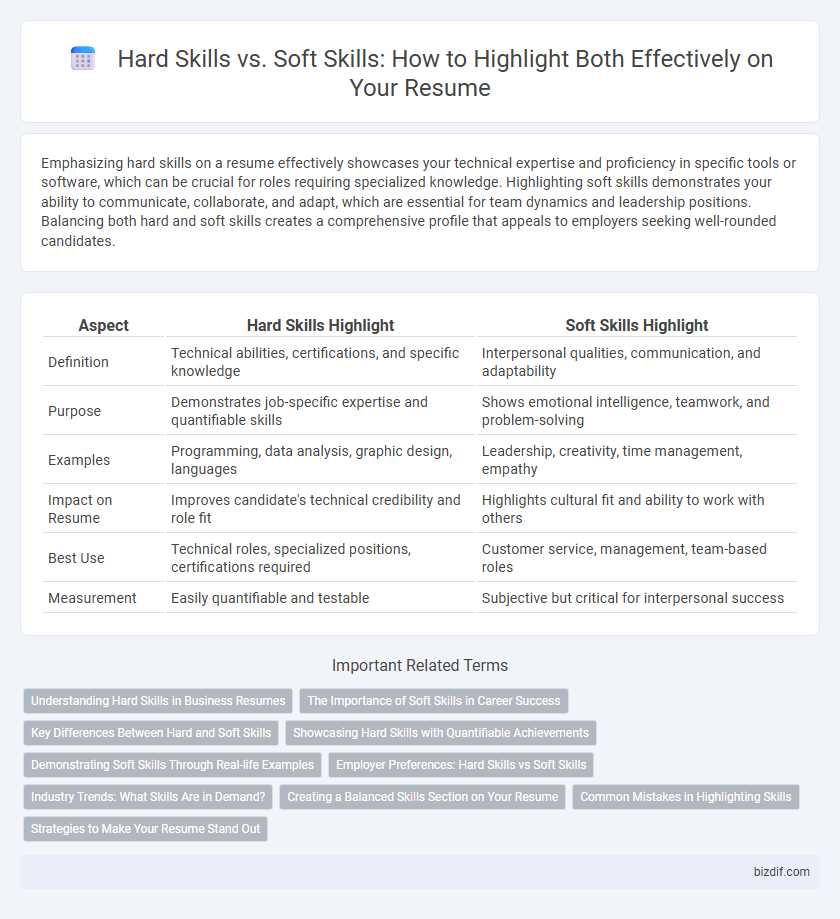Emphasizing hard skills on a resume effectively showcases your technical expertise and proficiency in specific tools or software, which can be crucial for roles requiring specialized knowledge. Highlighting soft skills demonstrates your ability to communicate, collaborate, and adapt, which are essential for team dynamics and leadership positions. Balancing both hard and soft skills creates a comprehensive profile that appeals to employers seeking well-rounded candidates.
Table of Comparison
| Aspect | Hard Skills Highlight | Soft Skills Highlight |
|---|---|---|
| Definition | Technical abilities, certifications, and specific knowledge | Interpersonal qualities, communication, and adaptability |
| Purpose | Demonstrates job-specific expertise and quantifiable skills | Shows emotional intelligence, teamwork, and problem-solving |
| Examples | Programming, data analysis, graphic design, languages | Leadership, creativity, time management, empathy |
| Impact on Resume | Improves candidate's technical credibility and role fit | Highlights cultural fit and ability to work with others |
| Best Use | Technical roles, specialized positions, certifications required | Customer service, management, team-based roles |
| Measurement | Easily quantifiable and testable | Subjective but critical for interpersonal success |
Understanding Hard Skills in Business Resumes
Understanding hard skills in business resumes involves emphasizing technical abilities and industry-specific knowledge critical for job performance, such as proficiency in data analysis, software tools, or financial modeling. These measurable skills demonstrate a candidate's capacity to perform core tasks and solve practical problems, enhancing the resume's relevance to hiring managers. Clear quantification of hard skills through certifications, projects, or metrics significantly improves the resume's impact in competitive business environments.
The Importance of Soft Skills in Career Success
Soft skills such as communication, teamwork, and adaptability play a crucial role in career success by enhancing collaboration and problem-solving abilities in diverse work environments. Employers increasingly prioritize emotional intelligence and leadership qualities alongside technical expertise to ensure effective project management and team cohesion. Balancing hard skills with strong soft skills creates a well-rounded professional profile that drives long-term growth and organizational impact.
Key Differences Between Hard and Soft Skills
Hard skills refer to technical abilities and specific knowledge required for a job, such as programming, data analysis, or proficiency in software tools, which are easily measurable and teachable. Soft skills involve interpersonal traits like communication, leadership, and adaptability, essential for teamwork and workplace culture but harder to quantify. Emphasizing hard skills in a resume showcases concrete qualifications, while highlighting soft skills demonstrates emotional intelligence and problem-solving capabilities.
Showcasing Hard Skills with Quantifiable Achievements
Showcasing hard skills with quantifiable achievements provides concrete evidence of a candidate's expertise, such as proficiency in Python demonstrated by completing 10+ data analysis projects improving efficiency by 30%. Recruiters prioritize measurable results, making it essential to include specific tools, technical certifications, and performance metrics. This approach strengthens a resume by directly linking hard skills to successful outcomes, increasing credibility and employability.
Demonstrating Soft Skills Through Real-life Examples
Demonstrating soft skills through real-life examples in a resume effectively illustrates communication, leadership, and problem-solving abilities, making these traits tangible to employers. Including specific instances where challenges were overcome or teamwork led to success enhances credibility and differentiates candidates from others. This approach ensures soft skills are not just listed but proven, increasing the impact on hiring managers.
Employer Preferences: Hard Skills vs Soft Skills
Employers increasingly prioritize hard skills such as data analysis, programming, and technical certifications because these skills directly impact job performance and productivity. However, soft skills like communication, teamwork, and problem-solving remain essential for collaboration and leadership roles. Balancing hard skills and soft skills highlights in a resume aligns with employer preferences for candidates who possess both technical expertise and interpersonal abilities.
Industry Trends: What Skills Are in Demand?
Industry trends show a growing demand for a balanced combination of hard skills such as data analysis, programming, and digital marketing, alongside soft skills like adaptability, communication, and problem-solving. Employers prioritize candidates who demonstrate technical proficiency paired with emotional intelligence to navigate hybrid work environments and rapidly evolving technologies. Highlighting both skill sets effectively on resumes increases competitiveness in job markets driven by automation and remote collaboration.
Creating a Balanced Skills Section on Your Resume
Creating a balanced skills section on your resume involves showcasing hard skills such as programming languages, data analysis, and project management alongside soft skills like communication, teamwork, and problem-solving. Highlighting technical proficiencies with quantifiable achievements demonstrates expertise, while emphasizing interpersonal abilities illustrates adaptability and leadership potential. This combination maximizes appeal to employers seeking candidates with both specialized knowledge and effective collaboration capabilities.
Common Mistakes in Highlighting Skills
Common mistakes in highlighting hard skills include listing outdated or irrelevant technical abilities that do not match the job requirements, while soft skills are often described using vague, generic terms without concrete examples. Candidates frequently fail to quantify hard skills with certifications or project outcomes, and they omit demonstrating soft skills through storytelling or achievements. Balancing specific, measurable hard skills with illustrated, contextual soft skills is essential to create a compelling resume that resonates with recruiters and ATS systems.
Strategies to Make Your Resume Stand Out
Emphasizing hard skills such as technical proficiencies, certifications, and industry-specific knowledge immediately demonstrates your qualifications and understanding of the role's requirements. Highlighting soft skills like communication, leadership, and problem-solving through quantifiable achievements and real-world examples creates a compelling narrative that distinguishes you from other candidates. Combining both with tailored keywords for applicant tracking systems (ATS) and clear, concise formatting ensures your resume captures attention in competitive job markets.
Hard Skills Highlight vs Soft Skills Highlight Infographic

 bizdif.com
bizdif.com